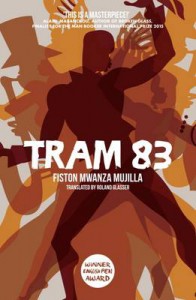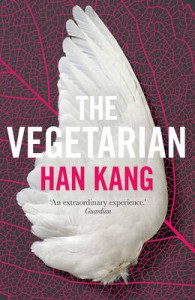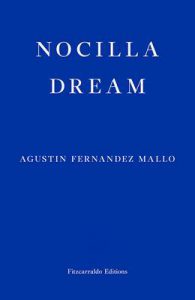 Tram 83 is the debut novel by Congolese writer Fiston Mwanza Mujila (published by Jacaranda in the UK and Deep Vellum in the US). It’s set in ‘the City-State’, which has seceded from its parent country and is now a mélange of locals and incomers, many drawn by the lure of wealth from the local mines. Lucien is an incomer, but his main intention is simply to write; he comes to the City-State with the help of his friend Reqiuem, whose preoccupations are rather more… worldly.
Tram 83 is the debut novel by Congolese writer Fiston Mwanza Mujila (published by Jacaranda in the UK and Deep Vellum in the US). It’s set in ‘the City-State’, which has seceded from its parent country and is now a mélange of locals and incomers, many drawn by the lure of wealth from the local mines. Lucien is an incomer, but his main intention is simply to write; he comes to the City-State with the help of his friend Reqiuem, whose preoccupations are rather more… worldly.
The environment of the City-State is multifarious, and can be bewildering to those unused to it. This is reflected in the jagged swirl of the prose and its arrays of details:
The Northern Station was going to the dogs. It was essentially an unfinished metal structure, gutted by artillery, train tracks, and locomotives that called to mind the railroad built by Stanley, cassava fields, cut-rate hotels, greasy spoons, bordellos, Pentecostal churches, bakeries, and noise engineered by men of all generations and nationalities combined. It was the only place on earth you could hang yourself, defecate, blaspheme, fall into infatuation, and thieve without regard to prying eyes. Indeed, an air of connivance hung ever about the place. Jackals don’t eat jackals. They pounce on the turkeys and partridges, and devour them.
Language surrounds Lucien as he tries to make his way through this place: dialogue cuts into description; repetitions abound, such as “Do you have the time?”, the constant, coded solicitation of the women who gravitate towards Tram 83.
Tram 83 is the City-State’s night club, where all the deals are done. In my mental map of the novel, the Tram is its pulsing heart, with lines and circles of language radiating out from there (Roland Glasser’s translation is superb at creating that sense). When reading this book, I was reminded of my experience of reading Mrs Dalloway, and the way that Woolf transformed a geographical space into a linguistic and mental one. It was as though events were taking place not just in London-the-city but also at the level of consciousness and thought.
There’s a similar sense of multiple levels in Tram 83. When Lucien tries to give a reading at the club, he doesn’t last long, and it’s as though he is beaten down by the language of the Tram itself. As the novel puts it:
There’s cities which don’t need literature: they are literature. They file past, chest thrust out, head on their shoulders. They are proud and full of confidence despite the garbage bags they cart around. The City-State, an example among so many others—she pulsated with literature.
Lucien tries to bring his own literature to the City-State, and succeeds to a certain extent. But he can’t tame the literature spreading out from Tram 83, and ultimately he becomes just another part of its web.

Is this a shortlist contender?
Yes, I think so. It’s such a powerful reading experience, I can’t imagine Tram 83 not making my final six. I’d like to see it on the real Man Booker International shortlist, too.
Other reviews
From the shadow panel, Tony Malone, Stu and Grant have reviewed Tram 83 to date. You can also find reviews by Lisa at ANZ Lit Lovers (who is also maintaining a list of all the shadow panel’s reviews), and Adrian Nathan West at Words Without Borders.
Book details (Foyles affiliate links)
Tram 83 (2014) by Fiston Mwanza Mujila, tr. Roland Glasser (2015), Jacaranda paperback
Read my other posts on the 2016 Man Booker International Prize here.
Like this:
Like Loading...
 This debut novel came along at the right time to be the kind of refresher that I was looking for. It’s July in Texas: jasper Curtis is released from prison after ten years, to move in with his sister Lizzie and her two daughters. Jasper is an interloper, in his family and the outside world: we don’t know exactly what he did to end up in prison; Lizzie doesn’t know whether she’s about to find her brother or a criminal; Jasper’s nieces don’t know him at all.
This debut novel came along at the right time to be the kind of refresher that I was looking for. It’s July in Texas: jasper Curtis is released from prison after ten years, to move in with his sister Lizzie and her two daughters. Jasper is an interloper, in his family and the outside world: we don’t know exactly what he did to end up in prison; Lizzie doesn’t know whether she’s about to find her brother or a criminal; Jasper’s nieces don’t know him at all.




Recent Comments